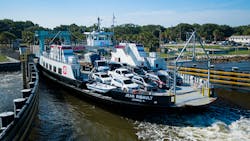FTA awards $47.5 million in ferry grants to 12 projects
The Federal Transit Administration (FTA) has awarded approximately $47.5 million from the Ferry Grant Program to 12 projects in 12 states. FTA explains the selected projects will improve access, safety and reliability of the nation’s ferries.
A Notice of Funding Opportunity for $30 million was issued in February 2020. FTA received 19 eligible proposals totaling approximately $102 million in funding requests from 14 states and the U.S. Virgin Islands. The amount of federal funds awarded consist of $30 million in Fiscal Year 2020 funding and approximately $17.5 million in FY19 funding.
"This $47.5 million in federal funding will improve mobility and enhance safety for passenger ferry services across our nation," said U.S. Transportation Secretary Elaine L. Chao.
The grants will fund projects to purchase, replace or rehabilitate passenger ferries, terminals and related infrastructure and equipment.
"Passenger ferries are an important mode of transportation across the country, providing thousands of people with access to employment, education and other critical needs," said FTA Acting Administrator K. Jane Williams.
Grant recipients were awarded between $1.2 million to $5.27 million in funding.
The New Orleans Regional Transit Authority (RTA) was awarded the largest award of $5.27 million for the Lower Algiers Ferry Terminal and Marine Maintenance Optimization Project. The grant award will be used for the first phase of an effort to rehabilitate transit authority ferry facilities and infrastructure.
“As a native resident of Algiers, we grew up using the ferry as both a mode of transportation and entertainment. This federal grant is recognition of the true value our Algiers Ferry brings to not only our residents and visitors, but the entire region,” said Louisiana State Senator Troy A. Carter, District 7, representing Algiers.
The Jacksonville Transportation Authority (JTA) in Jacksonville, Fla., was awarded $5.2 million for the St. Johns River Ferry Major Haul-Out Rehabilitation and New Ferry Boat, Phase V project. JTA says the grant will primarily fund an overhaul of the Jean Ribault vessel, as required every two to three years by the U.S. Coast Guard, to ensure a state of good repair, along with other improvements. The vessel is part of the St. Johns River Ferry, which became part of the JTA network in 2016 and experienced one of its most successful years in 2019 with the carrying of more than 457,000 passengers and more than 257,000 vehicles.
The New York City Department of Transportation was awarded $4.18 million for the Staten Island Ferry – St. George Terminal Roof Replacement project to address persistent leaking, roof drainage issues and joint damage, as well as improve energy efficiency and safety and security, while saving on operating and maintenance costs moving forward.
“The Staten Island Ferry is essential to the daily commute of tens of thousands of Staten Islanders who deserve dependable and efficient transportation,” said U.S. Sen. Kirsten Gillibrand (D-NY). “This funding will provide much needed renovations to the St. George Ferry Terminal roof and will ensure that New York City travelers remain safe and secure in transit.”
The Casco Bay Island Transit District (CBITD) in Portland, Maine, will receive $3.2 million to purchase a new electric hybrid propulsion system that will be used to power a new passenger ferry vessel as part of a vehicle replacement project. Casco Bay Lines estimates that the diesel electric hybrid propulsion system will eliminate up to 800 metric tons of CO2 emissions annually, while also reducing exhaust fumes, excessive engine noise and vibrations common on existing vessels.
“This is the final piece of funding necessary to move forward with the diesel-electric hybrid propulsion system,” said Hank Berg, general manager of CBITD. “We continue to be incredibly grateful to [U.S.] Sen. [Susan] Collins (R-ME) for her support of this project and look forward to working with MARAD to fully realize the benefits of this technology for CBITD, our riders and all of Casco Bay.”
The Chatham Area Transit Authority (CAT) was awarded $1.28 million for the CAT Capacity Expansion Ferry Acquisition project. The funds will allow for the purchase of a new 149-passenger ferry that will expand the Savannah Belles Ferry fleet from four to six boats, following the arrival of another 149-passenger ferry funded by a grant awarded in 2019.
The new ferries are expected to help accommodate increased demand expected from hotel and residential development projects along the Savannah Riverwalk and from the planned expansion of the Savannah Convention Center on Hutchinson Island.
The new water ferry funded by the 2019 grant is expected to join CAT’s fleet and begin operating in late 2021. The ferry funded by the latest grant is expected to arrive in mid to late 2022.
A full list of Ferry Grant Program recipients is available at the FTA’s website.
About the Author

Mischa Wanek-Libman
Group Editorial Director
Mischa Wanek-Libman is director of communications with Transdev North America. She has more than 20 years of experience working in the transportation industry covering construction projects, engineering challenges, transit and rail operations and best practices.
Wanek-Libman has held top editorial positions at freight rail and public transportation business-to-business publications including as editor-in-chief and editorial director of Mass Transit from 2018-2024. She has been recognized for editorial excellence through her individual work, as well as for collaborative content.
She is an active member of the American Public Transportation Association's Marketing and Communications Committee and served 14 years as a Board Observer on the National Railroad Construction and Maintenance Association (NRC) Board of Directors.
She is a graduate of Drake University in Des Moines, Iowa, where she earned a Bachelor of Arts degree in Journalism and Mass Communication.
